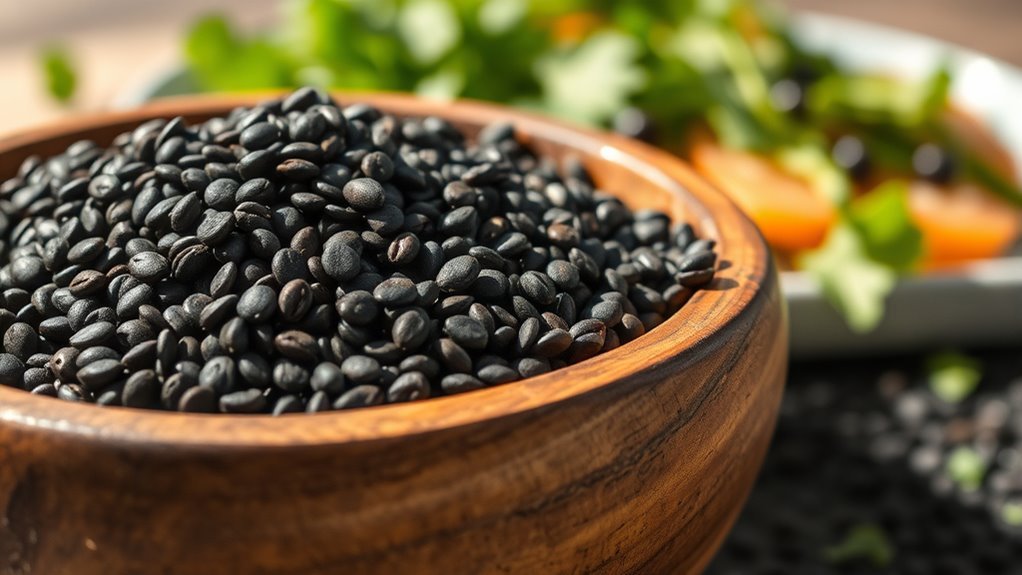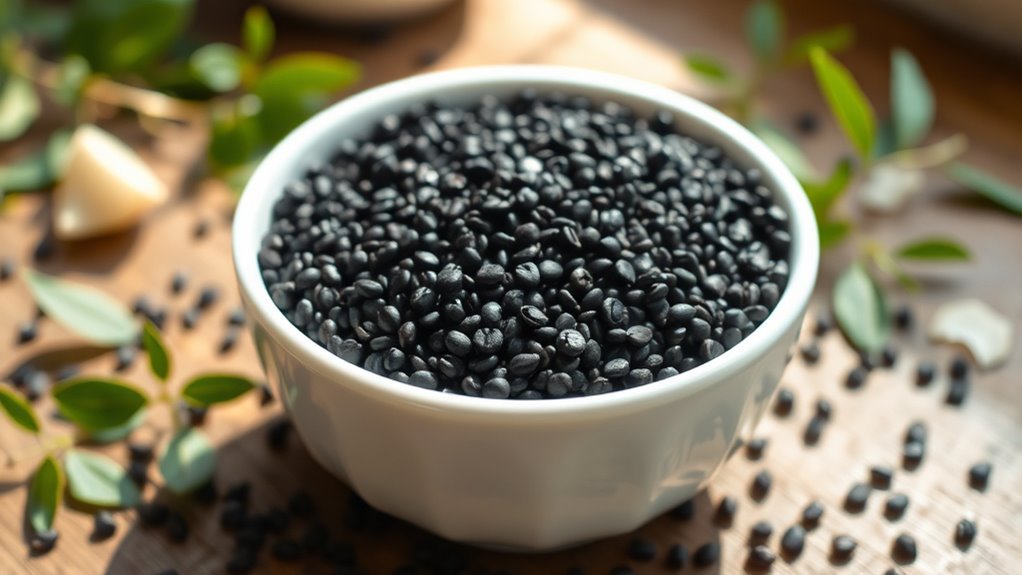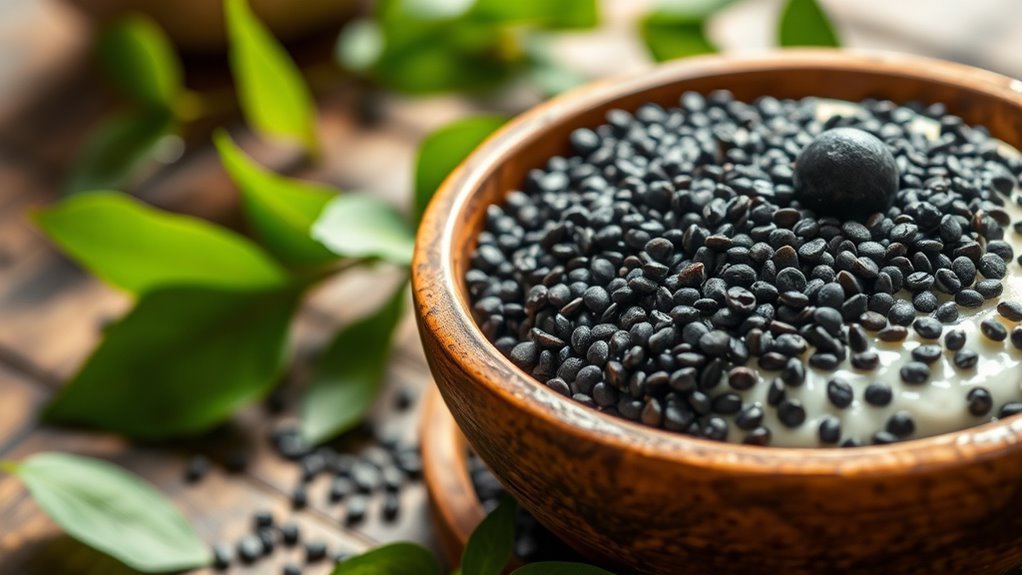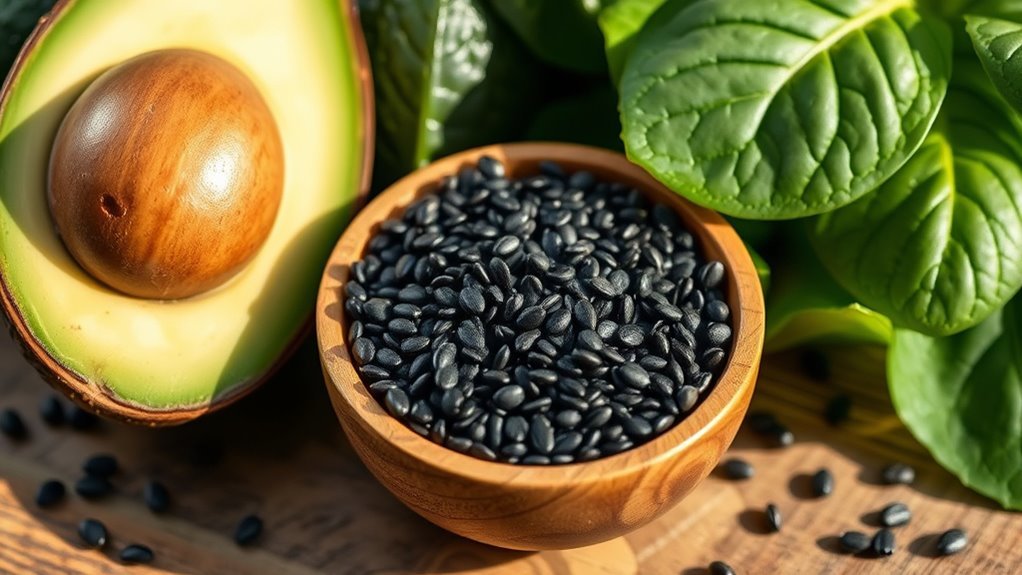Chia seeds are a fantastic option for your keto diet because they have about 2 grams of net carbs per serving after subtracting fiber. They’re packed with omega-3 fatty acids, protein, and essential minerals, making them nutrient-dense. Their unique ability to absorb liquid helps with hydration as well. Just keep an eye on portion sizes, and you’ll reap the benefits without exceeding your carb limits. There’s more to learn about incorporating chia seeds effectively into your meals.
Nutritional Profile of Chia Seeds

Chia seeds are often hailed as a nutritional powerhouse, making them a popular choice for various diets, including the keto diet. These tiny seeds pack a punch with their impressive nutritional benefits. They’re rich in omega-3 fatty acids, which support heart health and reduce inflammation. Additionally, chia seeds contain a significant amount of fiber, aiding digestion and promoting satiety, which can help curb cravings. They also provide essential minerals like calcium, magnesium, and phosphorus, contributing to overall bone health. With their unique ability to absorb liquid, chia seeds can help you stay hydrated. When incorporating chia seeds into your diet, you’re not just adding a food item; you’re enhancing your nutritional intake, fostering greater freedom in your dietary choices.
Carbohydrate Content and Net Carbs

For those following the keto diet, understanding the carbohydrate content of foods is essential. Chia seeds, while often touted as a superfood, contain carbohydrates that require careful consideration. In a typical serving of chia seeds, the carbohydrate breakdown reveals about 12 grams of total carbs. However, they also boast a significant amount of fiber—around 10 grams—which can be subtracted in your net carb calculation. This means that chia seeds effectively contribute only about 2 grams of net carbs per serving, making them a suitable option for keto enthusiasts. Incorporating chia seeds into your diet can provide you with essential nutrients without derailing your carb limits, allowing you the freedom to enjoy their benefits while maintaining ketosis.
Health Benefits of Chia Seeds

Chia seeds are remarkably nutrient-dense, packing a variety of essential vitamins and minerals into a small serving. Their high fiber content also supports digestive health, promoting regularity and gut function. Incorporating chia seeds into your diet could offer significant health benefits while aligning with your nutritional goals.
Nutrient Density Profile
Packed with essential nutrients, chia seeds offer a remarkable health profile that supports various dietary needs, including those following a ketogenic lifestyle. Their impressive nutrient density enhances nutrient absorption, making them a potential superfood for your diet. Rich in omega-3 fatty acids, fiber, and protein, chia seeds can help maintain energy levels while promoting overall health.
| Nutrient | Amount per 28g Serving |
|---|---|
| Omega-3 Fatty Acids | 5,055 mg |
| Fiber | 11 g |
| Protein | 4 g |
| Calcium | 177 mg |
| Antioxidants | High |
Incorporating chia seeds into your meals can provide essential nutrients and support your health goals without compromising your keto lifestyle.
Digestive Health Support
Although many foods can support digestive health, chia seeds stand out due to their unique combination of fiber and gel-forming properties. With a remarkable fiber content, these seeds can absorb water, expanding and forming a gel-like consistency that aids in digestion. This process not only promotes regular bowel movements but also helps maintain a healthy gut microbiome by acting as a prebiotic. Research suggests that the soluble fiber in chia seeds nourishes beneficial gut bacteria, fostering a balanced digestive system. When you incorporate chia seeds into your diet, you’re not just adding nutrients; you’re empowering your digestive health. This freedom from digestive discomfort can enhance your overall well-being, making chia seeds a valuable addition to a keto-friendly lifestyle.
How to Incorporate Chia Seeds Into a Keto Diet
Incorporating chia seeds into your keto diet can be both simple and rewarding. You can explore various chia seed recipes that align with keto principles while benefiting from their rich nutritional profile. However, it’s essential to maintain portion control to maximize these benefits without exceeding your carb limits.
Chia Seed Recipes
When you’re looking to enhance your keto diet, chia seeds can be a versatile addition that not only boosts your nutrition but also adds texture and flavor to your meals. One popular way to enjoy them is by making chia pudding. Simply mix chia seeds with almond milk, sweeteners like erythritol, and let it sit overnight for a delightful, low-carb treat.
Another great option is chia smoothies. Blend your favorite low-carb fruits with chia seeds and a source of healthy fat, like avocado or coconut oil, for a creamy, filling drink. These recipes not only satisfy your taste buds but also keep your carb intake in check, making them perfect for your keto lifestyle.
Nutritional Benefits Overview
Chia seeds are a powerhouse of nutrition that can seamlessly fit into your keto diet. Originating from ancient Mesoamerica, these tiny seeds were historically used for energy and endurance. They’re packed with fiber, protein, and healthy fats, making them an ideal addition to support your ketogenic lifestyle.
| Nutrient | Benefit |
|---|---|
| Fiber | Aids in digestion and fullness |
| Omega-3 Fatty Acids | Supports heart health |
| Protein | Helps maintain muscle mass |
| Antioxidants | Protects against oxidative stress |
Incorporating chia seeds into your meals is simple. You can add them to smoothies, yogurt, or salads, allowing you to enjoy their benefits while embracing your freedom of choice in a keto-friendly way.
Portion Control Tips
To maximize the benefits of chia seeds within a keto diet, understanding portion control is key. Chia seeds are nutrient-dense but can add up in carbs if not consumed mindfully. Aim for portion sizes around one to two tablespoons daily—this equates to about 12-24 grams of carbs, depending on your overall intake. Consider incorporating them into smoothies, yogurt, or salads for added texture and nutrition. A serving suggestion could be mixing chia seeds with almond milk for a keto-friendly pudding. By monitoring your portions, you can enjoy the health benefits of chia seeds without compromising your ketogenic goals. Balancing these seeds with other low-carb foods helps maintain a satisfying and flexible diet.
Chia Seeds vs. Other Keto-Friendly Seeds
While considering the best seeds for a keto diet, it’s essential to compare chia seeds with other options that align with low-carb principles. Chia seeds are nutrient-dense, but how do they stack up against pumpkin and flax seeds?
Here’s a quick comparison:
| Seed | Net Carbs (per 1 oz) | Fiber (per 1 oz) |
|---|---|---|
| Chia Seeds | 2g | 10g |
| Pumpkin Seeds | 4g | 1g |
| Flax Seeds | 0g | 8g |
Chia seeds provide a superb source of omega-3 fatty acids and fiber, making them an excellent choice for satiety. Pumpkin seeds are slightly higher in carbs but offer magnesium and zinc, while flax seeds deliver minimal net carbs and significant fiber, enhancing digestive health.
Recipes Featuring Chia Seeds for Keto Meals
When you’re looking to incorporate chia seeds into your keto meals, you’ll find that their versatility makes them an ideal ingredient in a variety of recipes. One popular option is chia pudding, which combines chia seeds with unsweetened almond milk and a keto-friendly sweetener. This method not only results in a creamy texture but also provides healthy fats and fiber, perfect for maintaining ketosis. Another great choice is chia smoothies. By blending chia seeds with spinach, avocado, and coconut milk, you create a nutrient-dense drink that keeps you full and energized. These recipes showcase how chia seeds can enhance your keto diet while offering numerous health benefits, making them a fantastic addition to your meal planning.
Potential Concerns and Considerations
Although chia seeds offer numerous health benefits, there are potential concerns and considerations when incorporating them into a keto diet.
- Potential allergies: Some individuals may have allergies to chia seeds, leading to digestive issues or more severe reactions.
- Serving sizes: It’s essential to monitor your serving sizes, as excessive consumption can lead to unwanted carb intake.
- Hydration: Chia seeds absorb water, which may cause dehydration if not consumed with adequate fluid.
- Digestive effects: Overconsumption can result in bloating or discomfort, so start with small amounts.
- Nutrient balance: While nutritious, chia seeds shouldn’t replace other crucial foods in your diet, as variety is key for overall health.
Stay mindful of these factors to make informed choices about your keto journey.
Frequently Asked Questions
Are Chia Seeds Suitable for a Vegan Keto Diet?
Chia seeds are a treasure trove for anyone venturing into vegan keto nutrition. They offer a delightful blend of fiber, protein, and healthy fats, enhancing your meals while supporting keto benefits like weight loss and improved energy levels. With their low net carb count, chia seeds fit seamlessly into your diet, allowing you the freedom to enjoy nutritious meals without compromising your values. Incorporating them can elevate your vegan journey to new heights.
Can Chia Seeds Cause Digestive Issues on Keto?
Chia seeds can cause digestive issues on keto for some people, mainly due to their high fiber content. While chia seed digestion is generally beneficial, the keto fiber found in them can lead to bloating or gas, especially if you’re not used to high fiber diets. It’s essential to introduce chia seeds gradually and drink plenty of water to aid digestion. Listen to your body and adjust your intake accordingly for maximum comfort.
How Do Chia Seeds Affect Ketosis?
Chia seeds can positively affect ketosis by providing essential nutrients without spiking your carb intake. Their high fiber content promotes satiety, which supports ketosis sustainability. Plus, chia seed benefits include omega-3 fatty acids, helping to reduce inflammation and improve heart health. When you incorporate them into your diet, you’re enriching your meals while maintaining freedom in your food choices. Just be mindful of your overall carb count to stay in ketosis.
Are There Any Allergies Associated With Chia Seeds?
Yes, there are allergies associated with chia seeds, though they’re relatively rare. For instance, if you’re like Sarah, who developed itchy rashes and digestive issues after incorporating chia seeds into her diet, you might be experiencing chia seed allergies or sensitivities. Studies indicate that some individuals might react to the proteins in chia seeds, leading to symptoms ranging from mild to severe. It’s vital to monitor your body’s responses when trying new foods.
Can Chia Seeds Replace Other Fats in a Keto Diet?
Yes, chia seeds can serve as a partial fat substitution in a keto diet. They’re nutrient-dense, providing fiber, protein, and essential fatty acids. While they don’t contain as much fat as oils or avocados, their omega-3 content can complement your diet. You can blend them into smoothies or use them in baking to enhance texture and nutritional value. Just remember, they shouldn’t completely replace your primary fat sources for best results.
Frequently Asked Questions about Chia Seeds and Keto Diet
1. Are chia seeds keto-friendly?
Yes, chia seeds are considered keto-friendly. They are low in carbohydrates and high in healthy fats, making them suitable for a ketogenic diet. A typical serving of chia seeds (about 28 grams or 2 tablespoons) contains approximately 12 grams of carbohydrates, but 11 grams of those are fiber, resulting in only 1 gram of net carbs. This makes chia seeds a great option for adding nutrition without significantly impacting your carb intake.
2. How do chia seeds fit into a ketogenic meal plan?
Chia seeds can be incorporated into various meals and snacks on a ketogenic diet. You can add them to smoothies, yogurt, or salads, or use them to make keto-friendly puddings and baked goods. They not only provide healthy fats and fiber but also help to keep you feeling full longer, which can be beneficial for weight management while following a keto diet.
3. What are the health benefits of chia seeds on a keto diet?
Chia seeds are packed with nutrients that can enhance your health, especially while on a keto diet. They are rich in omega-3 fatty acids, which are beneficial for heart health. Additionally, their high fiber content aids digestion and can help maintain stable blood sugar levels. Chia seeds also provide essential minerals such as calcium, magnesium, and phosphorus, contributing to overall well-being.
4. How can I prepare chia seeds for a keto diet?
Chia seeds can be prepared in several ways for a keto diet. One popular method is to make chia pudding by mixing chia seeds with unsweetened almond milk or coconut milk and letting it sit overnight. You can also add vanilla extract or sweeteners like stevia for flavor. Additionally, chia seeds can be sprinkled on top of salads, blended into smoothies, or used as a thickening agent in sauces and gravies.
5. Are there any drawbacks to consuming chia seeds on a keto diet?
While chia seeds are generally safe and nutritious, there are a few considerations to keep in mind. Some individuals may experience digestive discomfort if they consume too many chia seeds, particularly if not adequately hydrated. It’s important to start with small quantities and increase your intake gradually. Additionally, while chia seeds are low in net carbs, they still contribute to your daily carb limit, so it’s essential to account for them in your overall meal plan.
References
- https://www.ncbi.nlm.nih.gov/pmc/articles/PMC5465806/
- https://www.healthline.com/nutrition/chia-seeds-keto
- https://www.webmd.com/diet/health-benefits-chia-seeds
- https://www.medicalnewstoday.com/articles/318319
- https://www.verywellfit.com/chia-seeds-nutrition-and-health-benefits-5185618
- https://www.researchgate.net/publication/278330260_Chia_Seeds_Health_Benefits_and_Applications
- https://www.sciencedirect.com/topics/food-science/chia-seeds


